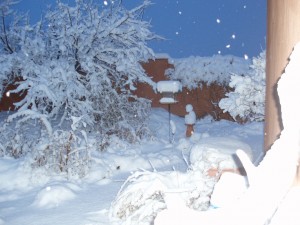 I’m over at Word Whores today, talking about winter sports. I know, I know – not my topic!
I’m over at Word Whores today, talking about winter sports. I know, I know – not my topic!
 Author: Jeffe Kennedy
Author: Jeffe Kennedy
Give Me Leave or Give Me Burnout
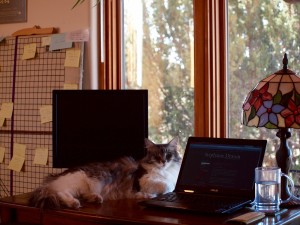 This is my partner cat, being helpful and giving me advice on my line edits. Never mind that Stephanie Draven’s website is up on the screen. A girl can take a break now and again.
This is my partner cat, being helpful and giving me advice on my line edits. Never mind that Stephanie Draven’s website is up on the screen. A girl can take a break now and again.
In fact, that’s my topic today in the How My Day Job Has Made Me a Better Writer series: time off.
I see a lot of writers on the internet saying things like this:
“It’s Saturday and the family is off to the park, but there are no weekends for writers.”
“Writers don’t get vacations.”
“It might be midnight, but I’m working because writers don’t have timeclocks.”
I’m sure you’ve seen it, too. Now, a lot of this is just toss-off stuff. People who are under deadline babble about all kinds of things. They’re kind of like the drunks at the bar at 3am, who’ve been there since Happy Hour, and keep arguing that it can’t possibly be last call. They’ve lost touch with reality. Don’t try to reason with them.
There is the syndrome of writers using vacation time from the day job to write. That’s something else entirely. Usually that’s a treat and a much more leisurely schedule than trying to get the writing done AND doing the day job.
My company offers us a very generous benefits package. They deliberately set out to create that for us. We get ten holidays, four weeks of vacation (if you’ve been there long enough), two personal days, forty hours of sick leave, plus another forty with supervisor approval. They are very good to us. And it’s not out of the goodness of their hearts.
It’s an investment in us as the primary assets of the company.
I mentioned in yesterday’s post that, as a consulting firm, the company I work for has no product outside of the brains of its staff. We work hard. We work long hours, sometimes under grueling conditions with difficult clients. And they expect us to take time off to recover.
I don’t have to connect the dots here, do I?
As writers (or whatever discipline you’d like to insert here), our product comes from ourselves. Just as the industrial types have to sometimes shut down the factory for maintenance, we must give ourselves down time, as well. The problem is, writers are more or less self-employed. Nobody gives you a list of the paid time-off you can take.
Which means we have to do it for ourselves.
It would be interesting to know if any full-time writers do this – issue themselves a certain amount of holiday, vacation and sick leave. It would be an interesting way to keep yourself accountable. And to minimize screwing-off time, too. If you have a leave bank, then you could take the time off guilt free.
All theoretical for me right now.
The “No One Edits Me” Syndrome
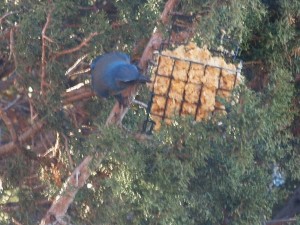 This isn’t a great photo, but I wanted to show you all what a pretty blue this pinon jay is. He doesn’t much like me pointing the camera at him, though.
This isn’t a great photo, but I wanted to show you all what a pretty blue this pinon jay is. He doesn’t much like me pointing the camera at him, though.
For today’s installment on the How My Day Job Has Made Me a Better Writer series, I want to talk about Quality Assurance (QA).
I once saw an interview with Anne Rice, who has long been one of my very favorite authors. This was right around the peak of her career. After The Witching Hour, when the Lestat books were oh-so-good. She was riding high, confiding to the televised audience that she’d been given a phenomenal amount of money for her next six books. She even said how much it was, as her contract forbade her to do, so that we would all know we could do it, too. At one point, she gave the interviewer a look and said, “Oh, believe me – No One edits ME.”
I’ve never forgotten it.
Especially as I slogged through her next books, each worse than the last, chock full of rambling and irrelevant information. I wondered what the hell she was thinking. Now I understand what her problem was.
She didn’t spend years in a corporate day job.
I think a lot of us have this idea about our work, whatever work it might be, that there’s something holy and perfect about it. And, if someone finds a flaw, this is somehow a personal indictment. When we’re young, especially, it’s almost unbearable to receive criticism of our work. Each point feels like a little flesh wound and we’re terrified of bleeding out.
In a work environment, you grow out of this really damn fast. Or you don’t succeed.
My firm does environmental consulting. I usually say I’m a data-jockey, but a seat-mate on an airplane recently corrected me and said, “No, you’re much more, because you understand policy. You look at the numbers, but then you bring the understanding of how to apply them in real-world situations.” That’s likely apropos of nothing, but I thought it was an interesting insight.
But that is what we do. I work with a lot of really smart people and we’re paid to give good advice. Our CEO often remarks that we have practically no inventory – the value of the company rests entirely in the brains of the staff. If our numbers aren’t spot-on or our reasoning isn’t sound, then we have no product.
QA is king.
We have levels upon levels of QA. People read, they spot check, they read again. If a client questions anything, we go over it again. Exhaustively. Believe me, if you ever had any ego tied up with being edited, you lose it. They’re not flesh wounds. This is people telling you when you have spinach in your teeth before the big photo shoot. Edit me – please!
On one of my writers’ loops lately, someone commented that an editor had asked for a revise and resubmit. She said she didn’t agree with the editor’s take and so she planned to self-publish it. I thought of my current client, who asks for all kinds of revisions I don’t agree with and how I do them anyway. Now, granted, this is my client’s report and not “the book of my heart,” but it is also my job. That’s what they pay me to do.
It occurs to me that, if I want them to pay me to write, then it becomes my editor’s book, too. And my publisher’s book. If I want them to invest in me and my book, then we all work together to make it a great product. As a writer, I have no real inventory. All the value is in my head. Without careful polishing, I have no product.
That’s just good business.
How My Day Job Has Made Me a Better Writer
We all know this. It’s a funky combination of emo artistry, social climbing, and snake-oil salesmanship. Now with the internet, we all get a ringside seat to the various shenanigans. The word “professionalism” gets bandied about a lot. Unfortunately, the people who seem to use it the most, often wielding it like a club to silence detractors, are the least professional at all.
From time to time I’ve bemoaned my corporate day job. For a number of years now I’ve been working towards supporting myself as a full-time writer. I’m lucky to work for a company whose mission I believe in and who treats me well. I’ve been with them coming up on 15 years. I’ve learned a great deal over the years, about dealing with colleagues, with clients and all the delicate balances of the corporate world.
I’ve realized recently that, as much as I’ve wished I’d spent the last 15 years writing instead of in this career, what I’ve learned will make me a better writer overall. So, I’m going to spend the next week or so exploring some of these lessons. Things like:
1) Understanding billable hours and being good at knowing how long something will take to do.
2) Taking advantage of leave time, because you need it.
3) Accountability and working with other people.
4) Working when you don’t want to.
5) Professional relationships – remembering the boundaries
6) Teamwork – dealing with edits and QA/QC
Let me know if you all have other topic ideas. I might even host some guest bloggers, if you have a particular tale to tell along these lines.
Should be fun!
25% For The Win
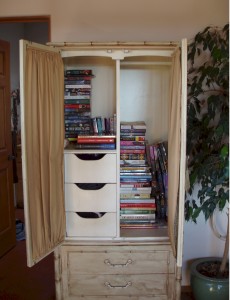 So, this is my To-Be-Read (affectionately known as the TBR) pile. Most of it. There is also a stack of books on my bedside table, with a few more in the drawers. This does not include the five pages worth of books on my Kindle.
So, this is my To-Be-Read (affectionately known as the TBR) pile. Most of it. There is also a stack of books on my bedside table, with a few more in the drawers. This does not include the five pages worth of books on my Kindle.
The worst part is, a lot of these books were in my TBR pile when we moved here 2 1/2 years ago.
Stupid People Tricks
 Happy New Year! May 2012 bring health, happiness and the best life has to offer. This is the moon grandly setting at midnight in Santa Fe. It was eerily gorgeous, so I take that as a promising omen.
Happy New Year! May 2012 bring health, happiness and the best life has to offer. This is the moon grandly setting at midnight in Santa Fe. It was eerily gorgeous, so I take that as a promising omen.
I’m over at Word Whores, confessing my secret talent. Hint: it’s not holding lipstick between my breasts.
Expertitis
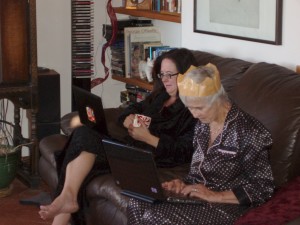 My family jokes that David and I spend a lot of time at Christmas offering “tech support.” We help everyone set up their new devices and work on their lists of things that haven’t been working right. They like to say that every question brings them one step closer to us booting them out the door, but we don’t mind. It’s good to be helpful.
My family jokes that David and I spend a lot of time at Christmas offering “tech support.” We help everyone set up their new devices and work on their lists of things that haven’t been working right. They like to say that every question brings them one step closer to us booting them out the door, but we don’t mind. It’s good to be helpful.
And, at least we can filter out the easy stuff from what needs to be advanced to the experts.
Back when I was in graduate school, lo these many moons ago, one of my professors had a sign on his office door that read something like “Experts don’t really know more than anyone else. They’re just better prepared and have slides.”
I tried to Google this for a source, but had little luck. The quip has been scrambled about many times. And, of course, this version is obviously quite dates. Slides?? Do you all remember making slides for presentations – where you’d photograph pages, develop the film (special slide film), cut the square you wanted from long strips and glue them into the little slide frames? It took DAYS to prepare for a presentation. And then you had to cart those slide carousels around… Now we fiddle with our Power Point presentations up until the last minute and simply plug in the laptop. Technology is such a wonderful thing.
ANYWAY.
My point is, I’ve always remembered this sign. And the wisdom of it.
This particular professor was very good at giving advice in a very new field at the time, of environmental toxicology. There wasn’t a lot of data yet. Most environmental toxicology works through chronic exposure. It’s difficult to draw a line from a few childhood years spent paddling beneath the paper mill to the cancer death 40 years later. In another hundred years, we might have some really good data. But I digress, yet again. What this professor could do was bring a wealth of experience in science and explain concepts in a way that people understood and could get excited about.
He also had a team of grad students to make really good slides.
So, though he had the critical thinking and clarity of self to recognize that as an “expert” he wasn’t really all that special, that very perspective made him really good at knowing what he didn’t know and gave him the drive to fill those gaps.
The flip side of this is the people who consider themselves experts without this wealth of experience.
I see this a lot in social media. Writers with no publication credits, or paltry ones, offering writing advice. Writers who get hired as editors with digital publishing houses who then start offering editing tips. People starting up digital publishing houses from their living rooms and weighing in on the state of publishing.
In a way, the interwebs are the great leveler. Quality of content is all. So, arguably, good advice is good advice and will win out. However, a lot of stuff out there floats to the top and it’s not exactly cream.
It’s a disease, really. Expertitis. Born of our longing to be vindicated, to be legitimate in a business that rarely offers these rewards. How do you quantify a successful writer, editor, agent or publisher? The recognition of our peers is a fickle thing. Money follows the trends, not necessarily the quality. In many ways, I suppose we have to crown ourselves, because no one else will.
But that takes some clarity and critical thinking.
It’s really not about the slides.
Teaching Beauty
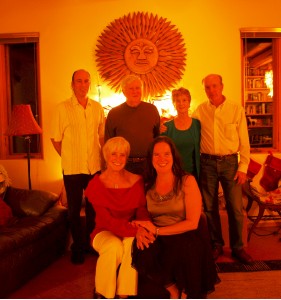 At one point during the Christmas weekend, my mom, my aunt and I were all in my bedroom. My Aunt Karen was borrowing a shirt so David could do a little work on her back and my mom tagged along.
At one point during the Christmas weekend, my mom, my aunt and I were all in my bedroom. My Aunt Karen was borrowing a shirt so David could do a little work on her back and my mom tagged along.
My mom sat down on my side of the bed and commented on the amazing view. I told her to lie down so she could see the sky the way I do when I wake up in the morning. When it’s *ahem* not pitch dark out, that is. I know, I know – the light is coming back around.
Karen pulled off her shirt, took the one I gave her and said how much she hates the moles on her back. She turned around to show us, and there they were, large flat moles all over her back.
“Just like Grandmother’s!” I exclaimed.
Karen nodded. Yes, she’d gotten her mother’s moles, turning up later in life. My mom said she didn’t remember their mother having moles. Oh yes, I remembered, Grandmother would take a bath every evening before bed and, if I was spending the night, I would keep her company and wash her back for her. The moles made me think of a Dalmation’s coat, beautiful, unique and special. Only seeing Karen’s moles did I remember that sense of delight and admiration. On some level, I always thought I’d have them, too. That when I grew up to be a lady like Grandmother, I would gain Dalmation polka dots to grace my own skin.
It’s funny how time changes things. How I’ve since learned it’s not something to admire. How Karen wishes she didn’t have them.
So much of what we think of as beautiful is taught. Carefully, carefully taught.
Frosty the Snowmom
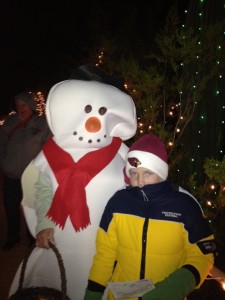 This is my mom, inside the Frosty costume, with one of my nephews. (Thanks to Hope for sending the pic!) And yes, that is a big dent in the side of the Frosty head. I asked my mom if she got in a tussle with a traffic cop and she said, no, it was from all the hugging.
This is my mom, inside the Frosty costume, with one of my nephews. (Thanks to Hope for sending the pic!) And yes, that is a big dent in the side of the Frosty head. I asked my mom if she got in a tussle with a traffic cop and she said, no, it was from all the hugging.
See, my mom has been learning to be a docent at Tohono Chul Park in Tucson. This is no show-up-and-volunteer gig. She has to take classes for something like six months, to learn about the regional flora and fauna. This involves homework, even. It’s been so fun to hear her tell us the names of birds and how to distinguish the different types of cholla. David and I have always been the biologists/naturalists in the family, but now she’s far surpassed us, especially on the botany end.
So, when the Tohono Chul people decided the old Frosty costume was getting ratty (see aforementioned dentable head), they purchased a new one, which the director would wear for their Holiday Nights festival. Then they thought, hey, why not get more mileage out of the old one, too? This is how my mother ended up dressed as Frosty.
Because, of course she volunteered to do it. Just like she’s memorizing how to tell a cardinal from a pyrrohuloxia. (I just asked her on IM what the false cardinal’s name is again. And she reminded me the main way to tell them apart is the beak.)
She’s always embracing life, learning and growing. I admire that so much.
Now she’s telling me about the phainopepla that eat mistletoe in the park and how mistletoe gets a bad rap.
Let me count the ways that I love her.
Playing with the New Toys
 One of the best parts of Christmas as a kid was playing with the new toys.
One of the best parts of Christmas as a kid was playing with the new toys.
It didn’t really matter what you got or how much. It was the thrill of a new thing and the free time to play with it. I remember riding my bike around the cul-de-sac one particularly sunny Denver Christmas. Or spending the day setting up my dollhouse. Yesterday, I got to play with my telephoto lens.
It’s super cool. 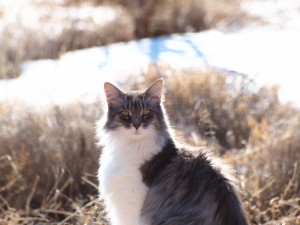 Isabel from quite a ways off, wondering why this thing is pointed at her.
Isabel from quite a ways off, wondering why this thing is pointed at her.
And here’s this mountain range,
with the telephoto.
I also have this stack of brand new books staring at me here…



